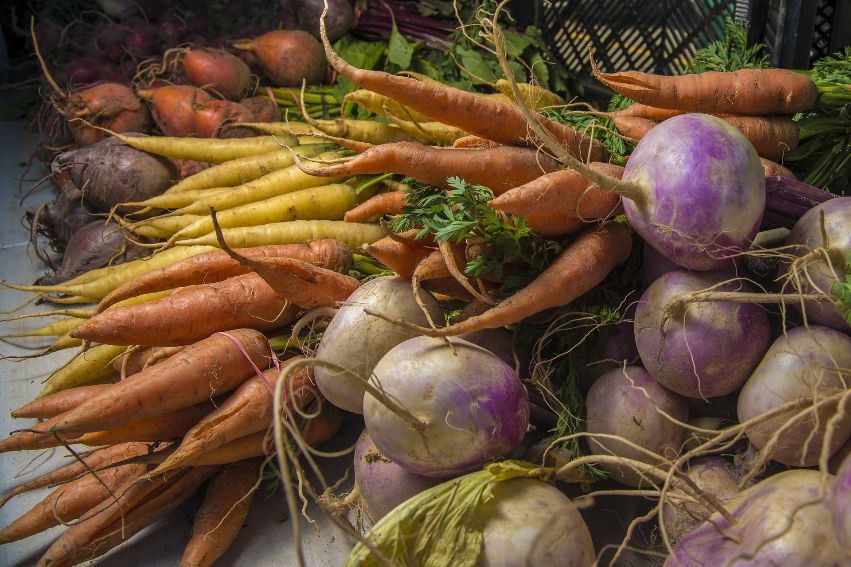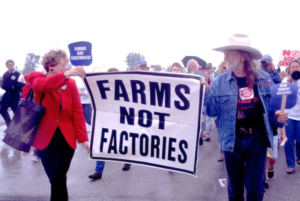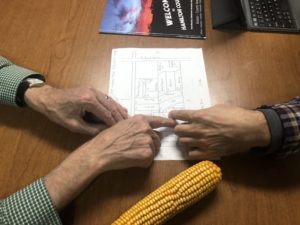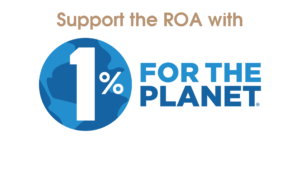Above: Over the next four years, Edacious will work closely with the ROA to identify…

Can you dig it?
It’s autumn in the north and as the harvest season winds down, we celebrate the hidden treasures of the soil – from the carrots, turnips, and beets, to the incredible microbiome that houses them all. At the ROA, we are also discovering the mighty connection of our collective regenerative community both near and far, who are all making themselves known in this collective intellectual biome. Just like the wonder of pulling up fruits of the root system, we are constantly discovering the opportunities to connect and grow this movement. We are also growing our roots deep into the regenerative movement.
We needn’t ring the alarm in every newsletter that we are in dire straits with climate change- you already know this, but what we do get the opportunity to do is take action. By gathering forces with compatriots of the soil out in the field and in convening with other climate & farmer activists, we build the momentum for change. Yet, I am reminded of Deval Patrick’s inspired keynote address at the B Corps Champions Retreat and his admonition: “Let the woke not forget to leave room for the waking…” We must remember all the while to keep a keen eye on the struggles farmers face with ever-changing climatic conditions, labor shortages, trade wars, rising costs, and lower prices.
How do we create economically viable solutions for farmers to move with rapid pace into this regenerative new world? There are more examples to shine light on this every day. Rodale is expanding its Regenerative organic regional resource centers, and Kiss the Ground has its wonderful soil advocacy training and the Farmer’s Footprint project. Other groups like the Land Stewardship Project have developed a promising organizing strategy that includes programs to stop corporate-backed factory farms, and offer workshops on soil health and building local food systems. We are impressed by the collective work of this community and look forward to building out our collaborative plans in 2020.
Together we can dig ever deeper.
In solidarity,

Elizabeth Whitlow
Executive Director, Regenerative Organic Alliance

Regenerative is the next Farming Revolution.
Many have expressed skepticism around the adopting of another word, another movement or yet another trend… as if there will be a moment where all will come to stasis. Well, that’s just not the world that we live in. And the same goes for movements. There will not be one movement to end all movements, but a continuous thread of one movement into another to answer the call of the day. And today, that movement and that word is regenerative.
We need this language now more than ever as we face a new farm crisis. When our food security is threatened, so is our social wellness. A wonderful article from the good folks at FoodPrint highlights the hard work of activists (including, of course, dear Willie Nelson) and sends it through a social justice lens. This is a keen distillation of the importance of the social and cultural aspects of such movements in farm country. It is again a reminder of the importance of broad-based coalitions collaborating to bridge the divide through grassroots organizing. We will continue this dialog as the words “organic” and “regenerative” continue to gain steam in the mainstream. Let us remember the facts, the opinions, and look between them to rely on the history of these farm movements to guide ours.
Speaking of facts, another article was recently published that has caused quite an uproar, and we suspect it will for you, too. Surprisingly, this article was posted on the PBS Newshour and has been much maligned for its misleading headline and ill-supported conclusions that organic farming actually could make global warming worse. The myth that organic farming can’t feed a growing population is one perpetuated by fossil fuel and chemical ag industries. As one commentator on the article thread noted… “it’s the same red herring used against renewable energy by the fossil fuel industry for decades.” It is our responsibility to bust these myths, take a deeper look, and action. To engage further, please read Vandana Shiva’s Op-ed in Truthout or Rodale’s rebuttal to the misinformation in this PBS post.

ROC audits are mostly spent in the field reviewing and learning about how farming practices affect the soil. Here at Grain Place Foods, the inspector reviews the historic map of crop rotations to best orient to the land and practices. Recently harvested regeneratively grown organic popcorn also made an appearance at the meeting.
ROC News!
We are in the final phases of the ROC Pilot. As we tend to the completion of the last audit on Dec 11th, we’ll be hard at work for the winter months with our partners at NSF to synthesize and summarize the lessons learned and key findings for the ROA board.
The Pilot’s goal was to test out the ROC Framework with different entities and commodities from small-scale diversified farms to larger small-grain row crop and livestock operations in the northern hemisphere as well as the small-holder coops in the subtropics. This also included the brands that will utilize these crops through ROC labeled products grown by their supply chains. This incredible journey wouldn’t have been achieved without the tremendously hard work of the inspired farmers, committed certifiers and their dedicated auditors. None of this would have been possible without the ROA board of directors’ deep engagement and our brilliant task forces that honed in on the standard, refining it to be tested directly in the field.
We will soon share our Task Force members and share the Deviation process NSF helped us develop, ensuring transparency and impartiality. Stay tuned to these communications, as we will soon share the revised October Framework and updated ROC resources.
As we ready for the upcoming year of launching our open application process for ROC, we look towards expansion and collaborative opportunities in Europe, Australia, South America and beyond. We have made our first investments in this expansion with our newest board member, Alfred Grand. While we update our website with all the aformentioned items, we invite you to meet Alfred’s work here. We are thrilled to welcome this farmer and soil scientist with a keen European perspective to the mission ROA.
1% will change the world.
And we’re not talking about that one percent. This 1% is being dedicated by the progressive businesses who devote 1% of their gross sales to non-profits engaged in saving the planet. We are so grateful to have the support of our friends at 1% and now be officially qualified as a recognized 1% recipient! Now this inspired collective of businesses, individuals, and nonprofits can activate their fiscal giving in support of the ROA.
Founded by Yvon Chouinard of Patagonia and Craig Mathews of Blue Ribbon Flies in 2002, 1% for the Planet is one of the most effective ways for pioneering companies to create action around their values in protecting the future of the planet. One 1% for the Planet has rapidly spread to thousands of businesses in nearly 50 countries. They are amplifying impact with dedicated staff who help align for-profit business partners with the nonprofit partners that speak to their values and complement their brand’s mission. We are confident that ROA will speak to many of the 1% business partners’ values around regenerative and land use practices. This is a full circle and truly pays tribute to Patagonia’s mission of being in business to save the home planet. Indeed the vision for the ROA was largely inspired by Yvon. We are humbled and grateful to be named a 1% For the Planet recipient.
Whether you are already a part of 1% for the Planet, are interested in joining as a business or individual member, or would like to support the ROA with a financial gift, we are ready for you. Please contact Kendall Miller who can guide you through the options for you or your company to learn more about 1% for the Planet and giving to the ROA.
